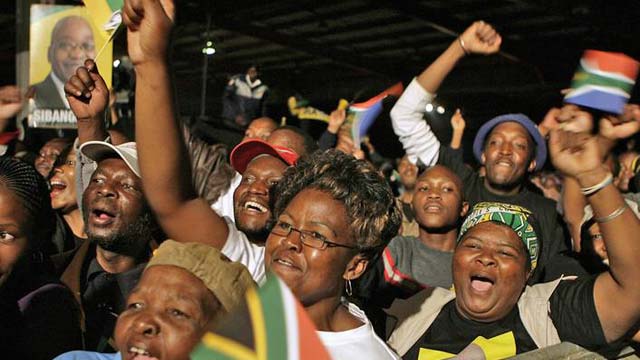
Building non-racialism is one of the values of South Africa’s democratic constitution. But it is not something that will be realised overnight, and what it means to build non-racialism may change under different conditions. It requires recognition and awareness that race remains both a social construction and part of the fundamental structural design of our society. It demands an awareness and sensitivity to the experiences of different sections of the population, particularly those who have suffered and continue to experience racism and resultant inequalities.
This week saw controversy surrounding an advertisement by the NGO Feed A Child SA depicting an apparently affluent white woman feeding an African child sitting beneath her table, much as one might feed a dog. In asserting their bona fides, the organisation’s spokesperson, Alza Rautenbach, explained: “Like a child, I don’t see colour; like a child, I don’t see race or politics…”
This was presumably to depict her concern as entirely humanitarian, only focusing on children. But can one act in a truly humanitarian way or as a humanist in a racist society when one does not “see” colour or race?
When one says one does not see race, one is also saying that one does not understand the experiences of people of particular racial groups in South Africa today. These are related to the history of racial oppression under apartheid. It is a form of erasure of past and present experiences, and of those deeply disadvantaged by it.
If we do not deconstruct what it means to see a person with a specific “racial” identity, we do not really understand what it is that has made the person be where they are: what difficulties they have experienced, what aspirations they have realised or seen crushed.
In short, being an African child is very different from just being a child of any colour. Such a child may only have access to polluted water in the North-West province. This may be true for whites, but they will more often have means to purchase clean water or purify their own water.
For some, being an Indian may mean having had experience of relocations and other state harassment under apartheid. For some, it may mean living with anxiety that Africans will be privileged over Indians in the current legal order.
If you are a Coloured, you may have a range of reactions to your past and present. You may have deeply ingrained scars from the discrimination and injustice meted out to you and your forebears, including the Group Areas Act, inferior schools and opportunities. But, as with some Indians, you may believe you are not “black enough”’ to get some jobs under affirmative action criteria.
If you are white, your worldview and experiences are very different. Yours has been a life shaped by privilege: better schools and generally positions of dominance. Even if you are from a poor background, the institutions of apartheid shielded you and provided access to the best opportunities.
Of course, not all Africans, Indians, Coloureds or whites have exactly the same experiences. But on the whole, these brush strokes follow the structural design of apartheid and continuing racism.
The starting blocks are not the same. When one arrives at work, the “other” person whose colour is not supposed to matter may be an African. That person may be reliant on taxis and other transport that make the person late, due to the unpredictability of the duration of the journey. Despite all efforts taken it may be impossible to be punctual. This may have created a level of anxiety that impacted on the person’s work performance. For others, it may have created a stereotype that Africans don’t keep time. However, if one bothers to ask, one may find that this particular person’s journey started at 4am.
In order to undo the damage of past and continuing inequalities we need to pay attention to the foundations of our society and the ways in which this continues to shape our present. We cannot change a phenomenon if we deny its existence.
It may well be that a time will come when it will be possible to treat race as insignificant, for racism may have been thoroughly addressed and racialised inequality eradicated.
But we have not reached the point where race is irrelevant or where being colour blind is a virtue. At this moment being very aware of one’s colour is an important element in building the society enshrined in the constitution.
In order to establish equality one needs to make an effort to understand the difference in accessing resources, which mediate any interaction between black and white. We also need to be aware of how videos such as that which Feed A Child aired may be read by people who have been treated like dogs, who have suffered intergenerational humiliations over centuries. Only with this self-awareness and awareness of the other person, will we be able to build an equal, non-racial society.
By Raymond Suttner
Professor Raymond Suttner, attached to Rhodes University and UNISA, is an analyst on current political questions and leadership issues. He writes a regular column and is interviewed weekly on Creamer Media’s Polity.org.za. Suttner is a former political prisoner and was in the leadership of the ANC-led alliance in the 1990s. He blogs at raymondsuttner.com. His twitter handle is @raymondsuttner.
